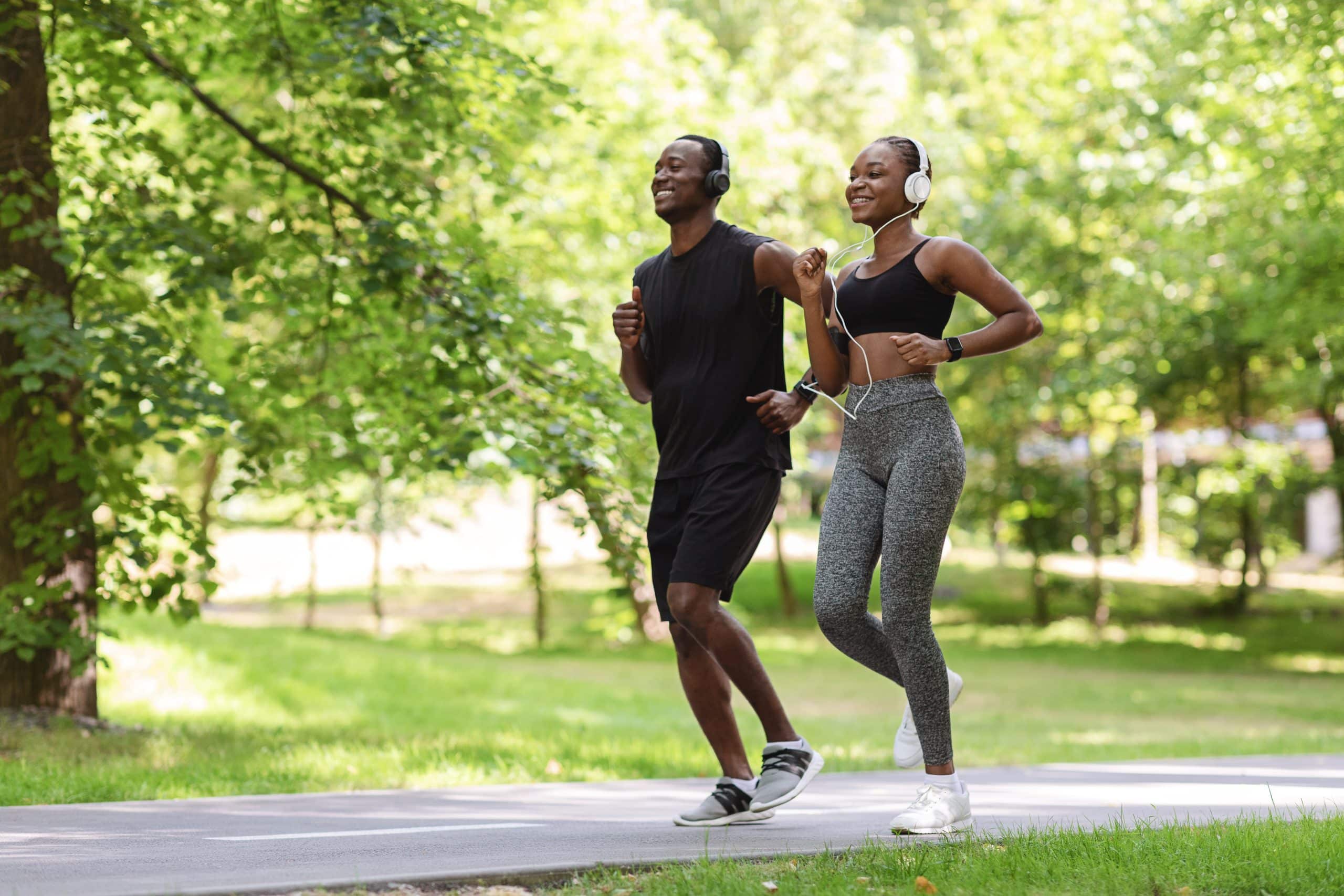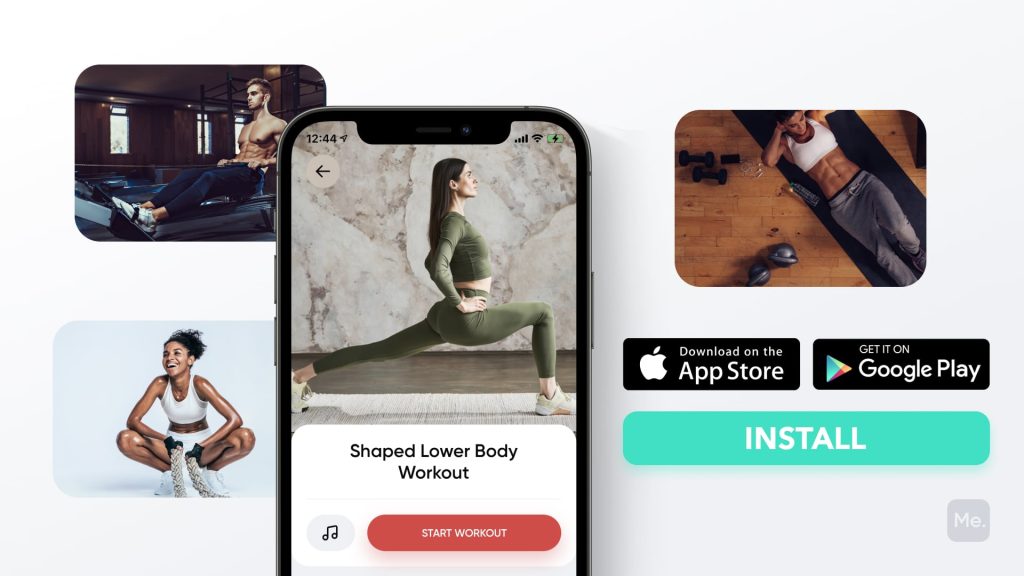The physical and mental benefits of jogging are very much well-documented. It can improve your heart health, help you lose weight, and increase your lifespan (9). However, if you’re over the age of 50, you might be wondering if it’s too late to start jogging. The good news is that it’s never too late to reap the benefits of this healthy activity.
Get your personalized
meal plan!
Since jogging is a high-impact activity, there might be some concerns that are too hard on your body if you’re over 50. We’ll address those concerns and give you some tips on how to start jogging safely at any age.
Moreover, some suggestions on how to make jogging a part of your overall fitness routine are also discussed. While this information is targeted at those over the age of 50, it’s important to note that everyone is diverse. If there are any health concerns involved, be sure to talk to your doctor before starting a jogging routine.
Note that people of all ages can benefit from the tips we are about to share. So, if you’re under 50 and looking for ways to start jogging safely, this information is also for you.
How To Start Jogging At 50?
Below are some tips on how to start jogging at 50 (or any age):
1. Get The Greenlight From Your Doctor
The first thing you need to do is get a checkup from your doctor. This is especially important if you have any health concerns that might be exacerbated by jogging.
Some conditions that might make jogging a bad idea include:
- Arthritis: This is a condition that affects the joints and can make jogging painful (1).
- Diabetes: Diabetes medications can make you more prone to low blood sugar levels, which can be dangerous when exercising (6).
- Osteoporosis: This is a condition that weakens the bones, making them more susceptible to fractures (7).
- Postoperation: If you’ve recently had surgery, your doctor will likely want to see how you’re healing before giving you the green light to start jogging.
2. Invest In The Right Gear
Investing in the right gear is important for 2 reasons. First, the right gear will help keep you safe while you’re jogging. Second, it will make jogging more comfortable, which will give you more reason to stick with it.
The most important piece of gear you’ll need is a good pair of running shoes. You might be tempted to buy the cheapest pair you can find, but that’s not a good idea. Running shoes are designed to provide support and cushioning for your feet, so it’s important to find a pair that fits well and is comfortable.
You might also want to invest in some other gear, such as:
- Running watch: A running watch can be a helpful tool for tracking your distance, pace, and heart rate.
- Heart rate monitor: If you’re concerned about your heart health, a heart rate monitor can help you keep tabs on your heart rate while you’re jogging.
- Sun protection: If you’ll be jogging outdoors, it’s important to protect your skin from the UV radiation of the sun. Wear sunscreen and/or clothing that covers your skin.
3. Start Slow
If you’re new to jogging, it’s important to start slow. Your body needs time to adjust to the new activity. Trying to do too much too soon can possibly lead to injuries.
Start by jogging for a few minutes at a time, and gradually increase your time as you get more comfortable. It’s also a good idea to start out slowly in terms of speed and distance. Don’t worry about how far or fast you’re going. Just focus on moving at a comfortable pace.
Read More: Benefits Of Hill Running And How To Do It Correctly
4. Master The Proper Form
Proper form is important for both safety and efficiency. The last thing you want is to get injured because you weren’t using the proper form. On top of that, if you’re using the proper form, you’ll be able to jog longer and faster with less effort.
Here are some pointers on the proper form:
- Spinal alignment: Your spine should be in a straight line, not hunched over or curved.
- Head position: Keep your head up, looking straight ahead.
- Foot strike: When your foot hits the ground, do so with your heel first, then roll through to your toe. Ensure that your feet land underneath your body, not out in front.
- Arms: Your arms should be at a 90-degree angle, with your elbows close to your sides. Your hands should be relaxed, not clenched into fists.
- Shoulders: Keep your shoulders relaxed and down, away from your ears.
5. Incorporate Intervals
Interval training is a great way to make jogging more effective. Intervals involve alternating between periods of high intensity and low intensity. So, for example, you might jog slowly for 2 minutes, then sprint for 1 minute.
Interval training has a number of benefits, including:
- It helps improve your speed and endurance.
- It’s more effective than steady-state cardio for burning fat.
- It can help break up the monotony of jogging.
If you’re new to interval training, start by incorporating short intervals into your jogging routine. For example, you might jog for 2 minutes, then sprint for 30 seconds. As you get more comfortable, you can increase the length of your intervals.
4. Incorporate Other Activities
Jogging is a great workout, but it’s not the only activity you should be doing. Incorporating other activities into your routine will help you stay fit and healthy.
Some activities you might want to add to your routine include:
- Walking: Walking is a great way to warm up before a jog and cool down after.
- Strength-training: Strength-training exercises help build strong muscles and bones. They can also help improve your balance and coordination (10)
- Yoga: Yoga can help improve your flexibility, which can make jogging more comfortable (12).
5. Make A Plan
Making a plan is important for 2 reasons. First, it will help you stay on track. Second, it will give you something to look forward to.
If you’re not sure where to start, there are plenty of resources available online and in books. You can also talk to a personal trainer or coach to get started. Once you have a plan, write it down or keep it on your smartphone so you can refer to it when needed.
6. Set Some Goals
Setting goals is a great way to stay motivated. When you have something to work towards, it’s easier to stay committed to your jogging routine.
Some goals you might want to set include:
- Improving your pace: If you’re currently jogging at a 10-minute-per-mile pace, your goal might be to improve to a 9-minute-per-mile pace.
- Running a certain distance: If you’re currently only able to run for 20 minutes at a time, your goal might be to run for 30 minutes.
- Running a race: There are plenty of 5K, 10K, and even half-marathon races you can sign up for. Training for a race can give you something to focus on and help improve your motivation.
BetterMe app will kick you out of the mental funk, shake off your extra weight, rid you off your energy-zapping habits, and help you sculpt the body of your dreams. Intrigued? Hurry up and change your life for the better!
7. Be Consistent
Consistency is the key when it comes to jogging. The more consistent you are with your workouts, the better results you’ll see. If you can’t commit to jogging every day, try to jog at least 3 or 4 times a week. In case you happen to miss a day here or there, don’t sweat it. Just pick up where you left off and keep going.
8. Join A Group Or Club
Jogging can be more fun when you do it with others. If you’re looking for some company, consider joining a jogging group or club in your area.
Not only will you have others to jog with, but you’ll also benefit from the camaraderie and support.
9. Rest And Recovery
It’s important to rest and recover after a hard workout. It doesn’t automatically mean that you have to take a day off from jogging, but you should take some time to let your body recover.
You can do this by:
- Stretching: Stretching helps improve flexibility and can prevent injuries.
- Foam rolling: Foam rolling is a form of self-massage that can help reduce muscle soreness.
- Taking a hot bath: A hot bath can help relax your muscles and relieve pain.
- Getting enough sleep: Sleep is important for overall health and well-being.
10. Check Your Diet
An exercise routine goes hand in hand with a healthy diet. Eating healthy foods will give you the energy you need to power through your workouts.
Some things to keep in mind when it comes to diet and jogging include:
- Hydration: Staying hydrated when you’re exercising is vital. Be sure to drink plenty of water before, during, and after your jog.
- Fuel: Eating a healthy snack before you jog can give you the energy you need. The snack should contain carbohydrates for quick energy and protein for lasting energy.
- Recovery: Eating a combination of carbohydrates and protein after you jog can help your muscles recover.
- Overall diet: A majority of your diet should consist of healthy, whole foods. This includes fruits, vegetables, lean proteins, and whole grains.
Why You Should Pick Up Jogging Later In Life?
As we mentioned earlier, there are many reasons to make jogging a part of your fitness routine, no matter your age.
Here are some specific benefits for those over 50 who would like to try jogging:
1. Reduce Risk Of Chronic Diseases
Chronic diseases like heart disease, stroke, and type 2 diabetes are some of the most common health problems in the world. They’re also some of the most preventable.
Regular physical activity can help reduce your risk of developing or dying from these chronic diseases (8). In fact, research has shown that being physically active can reduce your risk of dying from heart disease by as much as 40%.
Read More: Overweight Running: A Beginner’s Guide On Fitness And Nutrition
2. Improve Heart Health
Jogging can help strengthen your heart and improve your cardiovascular health. It does this by helping reduce blood pressure and improving blood circulation (9).
3. Weight Loss
Age-related weight gain is a common problem as we get older— partly due to a decrease in muscle mass and partly due to slower metabolism. Jogging can help you lose weight and keep it off, thanks to its ability to burn calories and build muscle (9).
In fact, you can burn between 300 and 400 calories by jogging for just 30 minutes. Coupled with a healthy diet, this exercise can help you achieve and maintain a healthy weight.
2. Slow Down Cognitive Decline
Cognitive decline is a normal part of aging. However, just because it’s common doesn’t mean you have to accept it. Studies have shown that being physically active can help slow down cognitive decline, especially in those who are over 50 (2).
Exercise improves blood flow to the brain, which helps keep your mind sharp. It also increases levels of brain-derived neurotrophic factor (BDNF), a protein that helps with neuron growth and survival (3).
3. Improve Mental Health
People of all ages can suffer from mental health problems, but those over 50 are at a higher risk because of age-related changes in the brain. Thankfully, exercise can help.
Jogging and other forms of aerobic exercise have been shown to improve mental health by reducing stress, improving sleep, and increasing levels of happy hormones like endorphins (5).
4. Strengthen Bones And Muscles
Osteoporosis is a common problem in older adults, but regular exercise can help. Weight-bearing activities like jogging help strengthen bones and slow down the loss of bone density (9).
Jogging can also help increase muscle mass, which naturally declines with age. This is important because muscles help support joints and keep you mobile.
5. Improve Balance And Coordination
As we age, our balance and coordination can start to decline. This can lead to falls and other accidents.
Good thing is that exercise can help! Research has shown that Tai Chi, a form of martial art that involves slow, controlled movements, can improve balance and coordination in older adults (11).
Jogging may not be quite as gentle as Tai Chi, but it can still help improve your balance and coordination.
Lean and toned up body isn’t just a far-fetched fantasy. Check out the BetterMe app and watch it propel your weight loss journey into high gear!
6. Increase Longevity
There’s no guarantee that you’ll live longer just because you start jogging at 50 (or any age), but research has shown that regular exercise can increase lifespan (4).
One study followed a group of over 14,000 adults for 6 years. They found that the more active participants were, the lower their risk of dying during the study period.
So, even if you can’t run a marathon, adding some jogging to your weekly routine may help you live longer and enjoy a better quality of life in your later years.
The Bottom Line
Jogging is a great way to improve your physical and mental health at any age. However, it’s especially beneficial if you start later in life. So, if you’re 50 or over and thinking about taking up this form of exercise, don’t let your age hold you back. Just be sure to start slowly and consult your doctor before beginning any new fitness routine.
DISCLAIMER:
This article is intended for general informational purposes only and does not serve to address individual circumstances. It is not a substitute for professional advice or help and should not be relied on for making any kind of decision-making. Any action taken as a direct or indirect result of the information in this article is entirely at your own risk and is your sole responsibility.
BetterMe, its content staff, and its medical advisors accept no responsibility for inaccuracies, errors, misstatements, inconsistencies, or omissions and specifically disclaim any liability, loss or risk, personal, professional or otherwise, which may be incurred as a consequence, directly or indirectly, of the use and/or application of any content.
You should always seek the advice of your physician or other qualified health provider with any questions you may have regarding a medical condition or your specific situation. Never disregard professional medical advice or delay seeking it because of BetterMe content. If you suspect or think you may have a medical emergency, call your doctor.
SOURCES:
- Arthritis (2017, nih.gov)
- Brain-derived neurotrophic factor and its clinical implications (2015, nih.gov)
- A Review of the Effects of Physical Activity and Exercise on Cognitive and Brain Functions in Older Adults (2013, nih.gov)
- Does Physical Activity Increase Life Expectancy? A Review of the Literature (2012, nih.gov)
- Exercise and stress: Get moving to manage stress (2022, mayoclinic.org)
- Exercise-related hypoglycemia in diabetes mellitus (2011, nih.gov)
- Osteoporosis Overview (2019, nih.gov)
- Physical activity, exercise, and chronic diseases: A brief review (2019, nih.gov)
- Running and jogging – health benefits (2022, betterhealth.vic.gov.au)
- Resistance training is medicine: effects of strength training on health (2012, nih.gov)
- Tai Chi Chuan can improve balance and reduce fear of falling in community dwelling older adults: a randomized control trial (2018, nih.gov)
- Yoga for Health: What the Science Says (2020, nih.gov)












